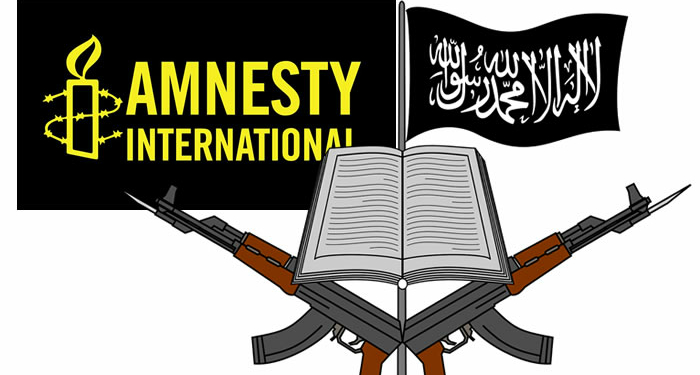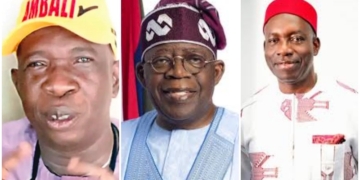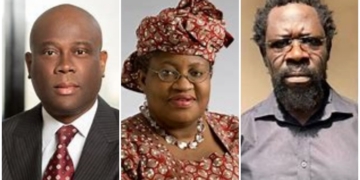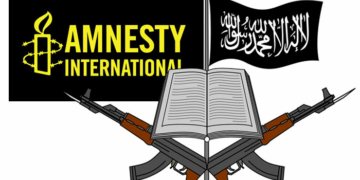The report by Amnesty International accused soldiers and members of Civilian JTF, a local vigilante group fighting Boko Haram in the northeast, separate women from their families into satellite camps where they are raped or sexually exploited in exchange for food.
The Federal Government of Nigeria and the Nigerian Army dismissed the report as fiction while reaction local civil society organizations bordered on violent as they staged protests demanding that Amnesty International leave Nigeria. The protests erupted one clear day before the report was officially published, signaling the document was leaked ahead of the embargoed time.
The Borno State government was not left out in this as the state issued a statement to debunk AI’s allegations as baseless and one lacking in facts.
The statement rather took turn to praise the military and their personnel for their satisfactory conducts across the camps in the north east, leaving Amnesty International like an orphan.
Even as the conflicting reactions trail the publication, two journalists that received the advanced copy of the report have confided in our correspondent that they decided against publishing the report or giving it prominence but they said the reactions to the publication in other media compelled them to again pick up the thread. Neither of them admitted to leaking the report ahead of publication.
Both journalists declined being identified. One cited fear of reprisals from Amnesty International while referring to suggestions that the NGO may be connected to a network of violent people. The second one wants to retain the privileges of getting invites to exclusive organized by Amnesty International and its allies and does not want to be identified.
One of them said, “When I got the report, there was a way my conscience was pricking because I know the things they wrote there are either blown out of proportion or they never even happened at all. Some of the things that have been discussed at one workshop they organized for us suddenly began to make sense, I see in retrospect that the trainings were actually brainwashing sessions that condition us (journalists) to take reports from foreigners without questioning.
“The people from Amnesty International once spoke about how they envisage that their operations would be scaled up in Nigeria but I never knew it was in relations to creating conditions that will allow Boko Haram to thrive. I think somehow my country is more important than any amount they want to pay me, after all where would I spend the money if Nigeria is in disarray like they want?” he queried.
The second journalist, who was more guided in his comments, blamed the federal government and the military for being slow in alerting citizens about the “true scale of evil” being implemented that organization. He questioned why the government allowed Amnesty International to operate like an occupying force in Nigeria.
According to him, “People will not understand the extent of powers that AI has, when they issue reports not reporting it is like death sentence. We are expected to accord it the same prominence as the US or UN. Yet, some of us have realized how evil it is, which is why it is a surprise that the government has not called them to order or not telling Nigerians early enough about the true scale of evil that they are executing in Nigeria.
“The role of the press is to report objectively and not to serve the public any perspective that doesn’t represent the interest of the country, but even this AI has taken away from us,” he said as he ruled out the possibility that the media in Nigeria can ever report objectively where Amnesty International is concerned.
The journalists revealed that officials of Amnesty International were enraged over the report being leaked, which gave local groups time to organize protests that detracted from its importance as a means of wiping up anger against the government and army and buy support for Boko Haram.
The officials were said to be worried that failing to meet key performance indicators could disrupt funding.
Amnesty International faces such criticism of supporting terrorists in Israel, where officials of its affiliates, like the Human Rights Watch, have been expelled. In 2015, Morocco expelled two Amnesty International staff over ‘a threat to public order’.
Local CSOs are demanding similar expulsions in the wake of the alleged rape. Demonstrators who vowed to keep occupying the organization’s office in Abuja are threatening to take matters into their own hands unless government takes steps to send officials of Amnesty International out of the country or at least shutter its operations, noting that its activities support Boko Haram terrorists and is imperiling the lives of Nigerians.
Comrade Danesi Momoh, the National Convener of the Civil Rights Groups, told protesters that “Nigerians are not going to sheepishly step on the conveyor belt of Amnesty International’s destabilization agenda to be like Iraq, Yemen, Libya and other countries where Amnesty International has successfully executed its contract of incapacitating the military through webs of lies spun in the name of upholding human rights.”
A statement by groups affiliated to Amnesty International said they were “disturbed” by the protest saying “We find it worrisome.”






Discussion about this post